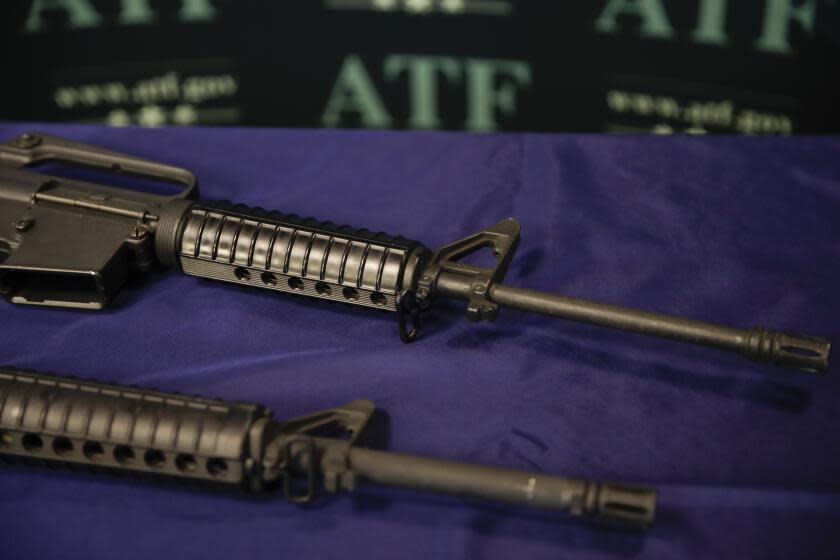Gun makers and retailers barred from selling ghost gun kits in California, court rules

Three gun companies have reached a settlement with California that permanently bars them from selling and making ghost gun kits in the state.
Sold in parts with no serial number and difficult to trace, law enforcement officials have called the prevalence of so-called "ghost guns" an epidemic, allowing people who are barred from owning guns to get their hands on them while also hindering criminal investigations.
"The manufacture and sale of ghost gun kits has created a largely chaotic industry that is a massive threat to public safety," Atty. Gen. Rob Bonta said in a statement announcing the settlement Tuesday. "Getting these manufacturers and retailers to keep untraceable guns off the market is a big win for public health and safety in California."
As part of the settlement, Blackhawk Manufacturing, GS Performance LLC, and MDC Corporation will be permanently barred from selling ghost guns kits and firearm precursor parts in the state. The companies also agreed to pay civil fines, including $500,000 from Blackhawk Manufacturing; $120,000 from Glockstore; and $55,000 from MDX.
"The influx of unlawful and untraceable ghost guns poses a serious public safety issue to residents of San Francisco and the state at large," said San Francisco Dist. Atty. Brooke Jenkins, who, along with the California attorney general and attorneys with the Giffords Law Center to Prevent Gun Violence, filed the suit against the companies in 2021.
In the initial complaint, the plaintiffs alleged the state is facing an epidemic of untraceable, fully functioning ghost guns, and that manufactures and retailers were operating without following firearm sale laws.
"As a result, people legally prohibited from purchasing or possessing firearms—usually due to their criminal histories—are easily able to obtain, assemble, and use ghost guns," the complaint reads.
The attorney general's office also alleged the companies selling ghost guns were misleading California consumers about the legality of the weapons.
"Ghost gun companies lull consumes into believing that their products are '100% Legal!,' yet fail to disclose the additional regulatory burdens, and potential criminal liability, that their consumers undertake by buying their wares and assembling ghost guns," according to the complaint.
Representatives from Blackhawk Manufacturing, GS Performance LLC and MDX Corporation did not immediately respond to a request to comment on the settlement.
In recent years, the presence of ghost guns in the streets has skyrocketed.
According to the California Department of Justice's firearms bureau, the number of ghost guns recovered by police in the state jumped 49,000% from 2015 to 2021.
Officials accused the three companies of undermining the federal Gun Control Act by selling the ghost gun kits without doing point-of-sale requirements, including background checks.
The companies did not admit to any wrongdoing as part of the settlement.
Law enforcement agencies and different jurisdictions have been looking for a way to address the surge of ghost guns, which have grown increasingly easy to find and purchase online. Some of their availability has been assisted by the use of 3-D printers, which can manufacture some of these weapons and their parts.
Voters in 2022 also passed AB 1621, which outlawed the sale of firearm parts without a serial number, and which the attorney general's office said has helped stem the use of ghost guns.
Ghost guns are expected to make their way into arguments at the Supreme Court soon, where the nine justices may decide on the legality of new federal laws targeted at the firearms.
In an effort to crack down on ghost guns in 2022, the Biden administration revised the federal definition of a firearm to include part kits, arguing that that kits to assemble operational weapons are "firearms."
This required that even unfinished parts, such as the frame or receiver of firearms, include serial numbers and require background checks to be sold.
U.S. District Judge Reed O'Connor in Forth Worth, Texas, struck down the rule last year, arguing that federal law does not cover parts of a gun.
The 5th Circuit Court in New Orleans refused to lift the order. The Biden administration successfully asked the Supreme Court to grant an emergency appeal that would keep the requirements in place until arguments, and a ruling, were made by the Supreme Court.
This story originally appeared in Los Angeles Times.


